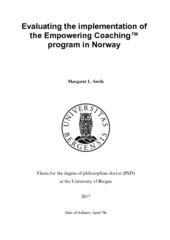| dc.description.abstract | Leisure sport is considered an important health promoting arena, where coaches play a crucial role, as they can help foster athletes’ motivation for long-term sports participation and reduce dropout. Youth sports coaches are often voluntary parents with little coaching experience. Therefore, previous research has emphasized the need for coach education programs, which help develop coaches’ sports-related skills and knowledge on how to enhance players’ motivation for sustained sports participation. However, there are inconsistent findings as to whether coaches use the knowledge acquired from coach education programs. Thus, a need for studying the pedagogical approach employed in these programs has been considered necessary, in addition to gaining an understanding of how a program is implemented by educators and responded to by the attending coaches. Therefore, the current thesis aimed to explore the implementation of the Empowering Coaching™ program in Norway, which was delivered to grassroots coaches (GCs) in youth soccer as a one-day workshop by trained coach educators (CEs). The program was developed within the PAPA project and builds on two theories of motivation; namely, self-determination and achievement goals. It aims to develop GCs’ knowledge of and competence in enhancing players’ motivation for sustained sport participation through creating motivational climates. Such climates rely on GCs being autonomy and relatednesssupportive, as well as task-focused, thereby emphasizing development rather than results. The thesis comprises three papers, which try to capture program implementation on two levels: CEs’ program delivery to GCs, and GCs’ reported use of the program. Paper I applied qualitative and quantitative data to explore the CEs’ program implementation, which in turn are aligned with a convergent parallel mixed methods design. The aim was to appraise the extent to which the CEs implemented the program with fidelity and to gain knowledge on what adaptations were made. The findings revealed that the program was delivered with moderate to high fidelity and that many positive adaptations were made, which mostly aligned with the program’s aims and theoretical foundation. The GCs were found to appreciate the program. Paper II applied a convergent parallel mixed methods design, including qualitative and quantitative data to explore both the CEs’ quality of delivery and the GCs’ responsiveness to the program in depth. Through observational methods, the CEs were found to demonstrate high-quality delivery, employing an empowering delivery style (i.e., modeling program principles) as well as, facilitating active engagement among the GCs. The GCs’ responsiveness was positive, indicated in terms of reporting to be highly satisfied with the CEs’ delivery quality and actively participating in the workshop. Paper III also employed a convergent parallel mixed methods approach, by applying self-reported questionnaire data to explore the GCs’ perceptions and use of the program six months after the workshop, while interviews were conducted in order to gain knowledge on perceived implementation barriers. The findings showed that, although the GCs had a positive perception of the program and found it easy to apply, only a few GCs often or always used program principles in their coaching practices. This seemed to relate to barriers perceived in terms of both individual and contextual factors that seemed to influence their use of the program, such as: lack of time, collaboration challenges with co-coaches, as well as lack of support from co-coaches and club leadership. Additionally, a need for follow-up sessions with CEs was reported. The findings from this thesis show that, although the Empowering Coaching™ program was well implemented by the CEs and met with positive responsiveness by the GCs, the GCs found it challenging to use the program principles in practice due to several barriers. The barriers were mainly related to contextual aspects, such as lack of support from co-coaches and club officials, and facilitation strategies in terms of follow-up by program providers. This indicates that program implementation ought to be explored through several levels of participants and within an ecological perspective in order to gain a more complete picture of how a program is implemented, as well as knowledge on how to enhance future program implementation. Furthermore, a one-day workshop does not seem comprehensive enough to change the GCs’ coaching behavior. | en_US |
| dc.relation.haspart | Paper I: Søvik ML, Larsen T, Tjomsland HE, Samdal O. (2016). Evaluating the implementation of the Empowering Coaching™ programme: balancing fidelity and adaptation. Health Education,116(3), 238-258. Full text not available in BORA due to publisher restrictions. The article is available at: <a href="http://dx.doi.org/10.1108/HE-07-2014-0077" target="blank">http://dx.doi.org/10.1108/HE-07-2014-0077</a> | eng |
